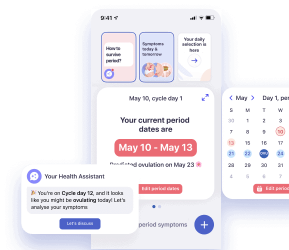Femia > Health Library > Being a mom > Raising a baby > 8-month sleep regression: Why it happens and how to help your baby sleep
8-month sleep regression: Why it happens and how to help your baby sleep

- Updated Feb 20, 2025
- Published
CRAFTED BY HUMAN
Crafted by human At Femia, we provide accurate and up-to-date information at every stage of your journey, from trying to conceive, pregnancy and postnatal support. All content is created by a real person based on in-depth research and own professional experience. Femia ensures that you will receive expert advice, strict accuracy and a personalized approach from our authors/medical experts. Learn more about our editorial policy.
FACT CHECKED
Fact checked At Femia Health, we maintain the highest standards of editorial excellence in delivering content focused on helping you conceive, guiding you through pregnancy, and supporting you postpartum. Explore our content review principles to learn how we ensure the accuracy and quality of our health and lifestyle tips for every stage of your journey.
- The 8-month sleep regression is a common phase of disturbed sleep that many babies experience around the 8-month mark.
- This temporary phase is usually linked to leaps in cognitive and motor development but can be triggered by teething, separation anxiety, and natural changes in sleep patterns.
- Maintaining a consistent bedtime routine, using gentle sleep training methods, and helping your baby with separation anxiety can help you get back to a good sleep routine within a few weeks.
You might have thought you’d finally cracked it, the sleepless newborn nights were a thing of the past, you’d gotten your baby into a rock-solid bedtime routine, and you’re now finally getting the decent chunk of sleep that you had so sorely missed when your baby was first born. And then it happens – the dreaded 8-month sleep regression. While it might feel that your baby has taken a step backward, don’t worry, you’re not back to square one. Sleep regressions are a normal part of your baby’s development and most importantly – they’re temporary.
Whether this is your first sleep regression, or your baby has had them before, we’re here to help you and your little one through this phase. Read on to find out what causes the 8-month sleep regression, what it means for you and your baby, and how you can both get through it without feeling overly frustrated and exhausted.

What is the 8-month sleep regression?
A “sleep regression” refers to a temporary phase when a baby’s previously stable sleep pattern becomes disrupted. This sudden change in sleep pattern is not a ‘regression’ in their ability to sleep, but a natural and temporary part of normal development.
Sleep regressions typically last between two and six weeks and can occur around 4, 8, 12, and 18 months of age. You may not notice a regression at every stage, but most babies will have a noticeable sleep regression at least at some point.
The so-called “8-month sleep regression” can occur anywhere from 7-10 months. While the 4-month sleep regression is linked to a change in the baby’s circadian rhythm (sleep/wake pattern), the 8-month sleep regression is typically linked to a change in their cognitive and motor development. Around this age your baby becomes more aware of their surroundings, more clingy with their primary caregivers, and more mobile. These big changes can impact how they fall asleep, how much sleep they need, and how often they wake.
👉Find out more: 10 foods to avoid while breastfeeding: What to skip for a healthy baby and milk supply
Signs of the 8-month sleep regression
If they’ve gone from sleeping well, or at least ok, to turning nap times and bedtime into a battle, then you may be wondering why your 8-month-old is not sleeping like they were. Well, they may simply be going through the 8-month sleep regression.
Here are some common signs of the 8–month sleep regression:
- Shorter daytime naps or battling naps. Lots of babies naturally start dropping the 3rd nap around this age. Many struggle with the transition and although their sleep needs are decreasing it can take them a few weeks to adjust to fewer naps and to not end up overtired by bedtime.
- Difficulty falling asleep. Where they previously could be put down sleepy but awake, they now require rocking or shushing.
- More frequently waking up at night, restless sleep. By 8–9 months, most babies need around 12–16 hours of total sleep per day, including 9–12 hours at night and two naps of 1–2 hours each. During a sleep regression, they may wake more at night, drop a nap, or even take longer naps to catch up on disturbed nighttime sleep.
- Needing help to fall back to sleep at night. Alongside waking up more at night, they may also struggle to get back to sleep without comfort from you. This can feel especially frustrating when it’s 2 a.m. and you’re exhausted.
- Increased fussiness or clinginess. If they’re having disturbed nighttime sleep or transitioning from 3 to 2 naps they may be more tired during the day. This can translate into increased fussiness and clinginess.
Why is my 8-month-old not sleeping?
It’s not always easy to pinpoint exactly what causes your babies 8-month sleep regression, but here are some of the most common reasons why your little one might be going through it:
- Physical developmental changes. Around 8 months of age, your baby’s motor skills take a big leap forward as they learn to sit up and crawl. Some will even start pulling themselves up to stand.
- Cognitive developmental changes. Overstimulation and increased awareness and engagement with the world around them can make it difficult for them to fall asleep, especially during the daytime.
- Natural change in sleep patterns. Around this time many babies naturally transition from 3 naps to 2. Although this is a normal part of development, many babies need time to adjust to the reduced sleep time. This can lead to a phase of them being overtired by the end of the day and consequently finding it more difficult to settle down into sleep and having more disturbed nighttime sleep.
- Separation anxiety. Big cognitive and emotional developments happen around this age leading to separation anxiety. This is a normal developmental stage babies go through as they become more aware of their surroundings and they consequently can become upset when away from their primary caregivers.
- Teething. Most babies start teething from around 6 months of age and while some seem entirely unbothered by it, others find it difficult, leading to sleep disturbances and fussiness.
How long does the 8-month sleep regression last?
If your baby’s sleep was disrupted for just a few days, it may not necessarily indicate a full sleep regression, as short-term disturbances can be caused by factors like illness, changes in routine, or temporary discomfort. Short-term sleep disturbances are often caused by factors like Illness, changes in routine, or a new environment but these typically resolve quickly. On the other hand, a typical 8-month sleep regression lasts anywhere from two to six weeks.
However, it’s important to remember that every baby is different. While some will find that their baby’s sleep stabilizes pretty quickly without much intervention, others will find that their baby needs a bit longer and even a little help to get back to normal.
My 8-month-old won’t nap: Does the 8-month regression affect naps?
Yes, the 8-month sleep regression can affect naps as well as nighttime sleep. You might find one or more of the following happens to your baby’s nap time:
- Refusing a nap. This can be a sign they are ready to drop a nap, or it may simply be a temporary consequence of the sleep regression.
- Nap gets shorter or longer if they need to catch up on disturbed nighttime sleep.
- They take longer to fall asleep. They might cry and fight their nap even when you know they need it. This could be from increased separation anxiety, overtiredness, or overstimulation.

How to help your baby sleep better during the 8-month sleep regression
While sleep regressions are temporary, they can be incredibly exhausting and frustrating for parents. Here are 8 tips you can try to help improve your baby’s sleep:
1. Bedtime routine
Keep persevering with a consistent bedtime routine. Avoid screens or energetic play in the run-up to bedtime and make sure your baby’s room is quiet and dimly lit with no obvious distractions. Use their tiredness cues to help you time naps and bedtime when they’re tired but not overtired. A large study of over 10,000 babies and children published in the journal Sleep found that having a consistent bedtime routine was associated with better sleep, including fewer instances of waking up in the night and increased overall sleep time.
2. Adjusting their nap schedule
If it’s time for your baby to drop a nap then make sure you keep to a consistent schedule for their other naps and bedtime. Where possible, keep putting them down drowsy but not asleep, this may seem like a struggle to begin with, but maintaining good habits can save you from future sleep issues.
3. Maximizing daylight and daytime activity
Make sure they have plenty of natural light during the day and lots of opportunities to practice their new skills so they feel less inclined to practice them at night.
4. Make sure they’re well-fed
Ensuring your baby gets adequate nutrition throughout the day can help minimize unnecessary wake-ups due to hunger, but not all night wakings are related to feeding needs.
👉Find out more: How much breastmilk should a newborn consume: A feeding chart for new parents
5. Managing separation anxiety
The goal is to provide comfort while gradually encouraging self-soothing, rather than reinforcing frequent nighttime wake-ups with prolonged interventions. Start by practicing separation with your baby for short periods, be clear in your intentions to leave and when you will be back, and leave something comforting of yours like an item of clothing close by.
6. Consider sleep training
If you’ve successfully used a sleep training method before then consider trying the same method again, you may find that within a couple of days, their sleep has drastically improved. If you’re new to sleep training then you might need to do some research first. There are many different sleep training methods out there and you will likely find one that both aligns with your baby’s needs and your beliefs.
7. Manage teething pain
The American Academy of Pediatrics (AAP) advises using cold damp washcloths, gentle gum massages, and rubber chew toys to help ease teething pain. Additionally, you can talk to your baby’s pediatrician about simple analgesics if you feel it’s needed.
8. Adjust your expectations
Remember that this is a normal part of your baby’s development and is just a phase. While it may feel disheartening, exhausting, and frustrating, we promise you will both get through it.
| Important to know: |
|---|
| You will likely find yourself having to adjust your routine and the ways you comfort your baby during this phase to help them sleep. But, it’s very important that you continue to follow safe sleep guidelines during this time. Also, bear in mind that any new comfort mechanisms you introduce now are likely to stick, so don’t introduce any new habits that you don’t want to have to keep long term. |
When to seek professional help
If you’ve tried several different strategies to help your baby through their 8-month sleep regression but nothing seems to be working then it might be time for a trip to the pediatrician. You should also consult a pediatrician if you notice any of the following:
- Extreme fussiness or inconsolable crying
- Very short or no naps at all
- Signs of pain or discomfort
- Feeding difficulties or not gaining weight as expected
- Breathing concerns like snoring, mouth breathing, or pauses in breathing
Your pediatrician will be able to rule out any underlying causes and give you personalized advice about ways you can help your little one sleep better.
Questions from the Femia community
Should I change my baby’s sleep schedule during this regression?
Adjusting wake windows and ensuring enough daytime sleep can help improve nighttime sleep. It may be time for them to drop a nap, but they will still need two 1–2 hour long naps during the day to stop them from becoming overtired.
Will co-sleeping help with the 8-month sleep regression?
While it may provide comfort, it’s important to ensure you’re adhering to safe sleep practices at all times. You should also try to avoid starting any new routines that you don’t wish to continue in the long term because while it might seem to help during a sleep regression, it could be very difficult to remove from your routine down the line.
Can sleep training help during the 8-month sleep regression?
Learning how to self-soothe and resettle after waking is a key skill that babies have to learn. Gentle sleep training methods can be effective at teaching these skills to your baby, but finding a method that you’re comfortable with, and following through, is key.
Does diet impact sleep during this regression?
Hunger can cause wake-ups and make it hard for your baby to fall back to sleep. Make sure they’re getting an adequate amount of milk and food during the day but in particular that they’re well-fed before bedtime. Many babies will be able to go through the night without feeding, but some may still require a night feed.
The bottom line
The 8-month sleep regression is a normal developmental phase many babies experience. This temporary sleep disruption can begin between 7 and 10 months and typically lasts a few weeks.
It can be disheartening for parents to suddenly find themselves woken multiple times a night and having to battle their baby at nap time, especially when they had previously been sleeping well. But, it’s important to remember that this is a temporary phase and strategies like sleep training, adjusting their nap schedule, and maintaining a relaxing and consistent bedtime routine will help you both get through it.
References
- Baby teething pain. (n.d.). HealthyChildren.org. https://www.healthychildren.org/English/ages-stages/baby/teething-tooth-care/Pages/Teething-Pain.aspx.
- Child’s sleep needs at 6 months to 2 years. (n.d.). HSE.ie. https://www2.hse.ie/babies-children/sleep/childs-sleep-needs-6-months-2-years/.
- Choc. (2020, September 23). Everything you need to know about 9-month sleep regression. Children’s Hospital of Orange County. https://choc.org/news/everything-you-need-to-know-about-9-month-sleep-regression/.
- Clinic, C. (2025, January 30). When and how to sleep train your baby. Cleveland Clinic. https://health.clevelandclinic.org/when-and-how-to-sleep-train-your-baby.
- Mindell, J. A., Li, A. M., Sadeh, A., Kwon, R., & Goh, D. Y. (2015). Bedtime Routines for Young Children: A Dose-Dependent Association with Sleep Outcomes. SLEEP, 38(5), 717–722. https://doi.org/10.5665/sleep.4662.
- Safe sleep. (n.d.). https://www.aap.org/en/patient-care/safe-sleep/?srsltid=AfmBOoosmdx6k_AQAEdHpuGbw5Yk-1KO9geqljy5uQQm_ElwMXVobEk3.
- Separation anxiety & sleeping trouble in young children. (n.d.). HealthyChildren.org. https://www.healthychildren.org/English/healthy-living/sleep/Pages/Separation-Anxiety-and-Sleeping.aspx.
- Understanding and Navigating Sleep Regressions. (n.d.). Penn Medicine Lancaster General Health. https://www.lancastergeneralhealth.org/health-hub-home/motherhood/the-first-year/understanding-and-navigating-sleep-regressions#:~:text=What%20Is%20a%20Sleep%20Regression,sleeping%20soundly%20through%20the%20night.
- Website, N. (2023, May 17). Separation anxiety. nhs.uk. https://www.nhs.uk/conditions/baby/babys-development/behaviour/separation-anxiety/.
- Website, N. (2024, March 7). Baby teething symptoms. nhs.uk. https://www.nhs.uk/conditions/baby/babys-development/teething/baby-teething-symptoms/.

Can sex induce labor? Read medical experts answer! Explore guide about best sex positions to naturally induce labor in a safe and effective way.

Curious if pregnant women can eat bacon? Learn whether bacon and turkey bacon are safe during pregnancy, along with tips for cooking and portion sizes.

What is newborn milk tongue and how to tell the difference between milk tongue vs thrush? Learn all about baby milk tongue and how to get rid of white tongue on baby.

